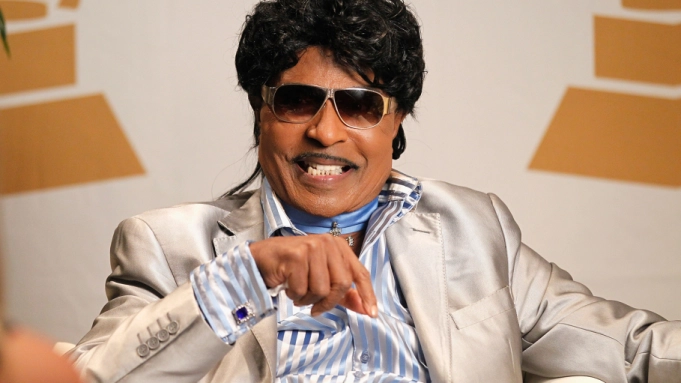His stage name was Little Richard and he was an American musician, singer and composer who lived from December 5, 1932 until May 9, 2020. His influence on popular music and culture went on for seven decades.
When Richard’s showmanship and dynamic music, characterized by furious piano playing, pounding backbeat and scratchy shouted vocals, built the foundations for rock and roll in the 1950s, his work became known as the “Architect of Rock and Roll.”
Popular music genres such as soul, funk, R&B, and hip-hop have all been affected by Richard’s upbeat rhythmic music and unusual emotional vocalizations. From rock to hip hop, he influenced a wide range of bands and singers.
In the film “Don’t Knock the Rock,” Little Richard made his acting debut. In 1957, Richard left the corporation to attend theological school and marry, but his wild lifestyle continued to conflict with his religious beliefs.
2. Little Richard’s Early Years
A church deacon and bricklayer, his father also managed the Tip In Inn, a nightclub where he sold bootlegged moonshine. In Macon, his mother was a member of the New Hope Baptist Church.
Due to a typing error, his given name was originally listed as “Ricardo,” but it was later corrected to “Richard.” Penniman children were raised in Macon’s Pleasant Hill area. They are now all adults. The nickname “Lil’ Richard” was given to him as a child due of his small stature and weak appearance.
In his youth, he was known as a naughty child who enjoyed playing pranks on others. He was born with a slight anomaly that resulted in one of his legs being shorter than the other. Little Richard‘s estimated monetary position
Also Read: Is Josh Lucas Gay: Early Life, Personal Life, Career and Everything You Need to Know!
Relationships and Familial Ties Are Also Important

A sixteen-year-old college student from Savannah, Georgia, named Audrey Robinson became Richard’s girlfriend in 1956. Richard and Robinson quickly became friends, despite Robinson’s disdain for rock ‘n’ roll music.
On the contrary, Robinson rejected Richard’s assertions in his 1984 book that he had persuaded Buddy Holly to have sex with her and that he had invited other guys to have sexual contact with her in groups;
When Richard interviewed Robinson for his 1985 documentary on The South Bank Show, Robinson vehemently denied Richard’s assertions. According to Robinson, Richard would utilise her to purchase meals at white-only fast food places because he was unable to enter any due to his skin tone.
“Unnatural” Was how Little Richard Described Homosexuality.
In the end, Little Richard could not come to terms with his sexuality because of his religious convictions.
In an interview with Three Angels Broadcasting Network in 2017, he commented, “All these things, so much unnatural affection.” “A lot of folks just go about their day-to-day lives and don’t give any thought to God.” Do not desire any of him. His love for you is unconditional, no matter who you are. Whatever you are, I don’t give a damn.
Because he cares about you, and because he has the power to save you. As simple as saying, “Lord, take me as I am” is all it takes. “I’m a sinner,” I confess. The problem is that “we’ve all sinned and fallen short of God’s glory.”
A Career in Music
In October 1947, Sister Rosetta Tharpe overheard Richard, then 14, singing her songs before a performance at the Macon City Auditorium. He was invited to open for her at her event.
After the event, Tharpe paid him, encouraging him to pursue a career in show business. Richard was inspired to learn the piano by Ike Turner’s piano introduction on “Rocket 88.”
According to other stories, Jordan may have had an effect on Little Richard. On Jordan’s new album “Caldonia,” a whooping sound that “sounds disturbingly like the vocal tone Little Richard would acquire” has been noted by one reliable source.
Achieving Early Gains and Conversions
“Long Tall Sally” (1956), Richard’s follow-up smash song, topped the R&B and Top 100 charts, as well as the UK’s top ten. Like “Tutti Frutti,” it sold more than a million copies. Little Richard’s estimated monetary position
When Richard found popularity, he established The Upsetters, which featured Clifford “Gene,” Grady, Olsie, and Buster, as well as bassist Olsie “Baylee,” and guitarist Nathaniel.
As part of a package tour, Richard first toured the United States. Art Rupe observed that “the similarities between Little Richard and Fats Domino for recording reasons were close.”
Drugs Are Also a Factor

For most of the 1950s, Richard was an abstainer of all forms of alcohol, tobacco and illegal drugs. Richard was well-known at this time for fining members of the band who were abusing drugs or alcohol.
Contrarily, Richard began smoking and using drugs during the mid-1960s, drinking excessively and smoking a lot of cigarettes and marijuana. By 1972, he had become dependent on cocaine. “I should have been called Lil Cocaine instead.”
He was addicted to heroin and PCP (often referred to as “angel dust”) by the time he was 25 years old. His job and personal life were adversely affected by his drug and alcohol abuse. After a while, he said, “I lost my logic.”
6. Theology
With the help of two uncles and his grandpa, Richard’s family had strong evangelical Baptist and African Methodist Episcopal Church (AME) Christian roots.
The Pentecostal churches in Macon were also a favourite of his because of their music, charismatic praising, dancing in the Holy Spirit, and speaking in tongues. The boy played the role of faith healer at the tender age of 10, singing gospel songs to the sick.
After he prayed for them, they’d often say they felt better and gave him money, he added afterwards. Richard was inspired to become a preacher by Brother Joe May, a singing evangelist.
Also Read: Rob Beckett Gay? Early Life, Personal Life and Everything You Need to Know!



Comments are closed.